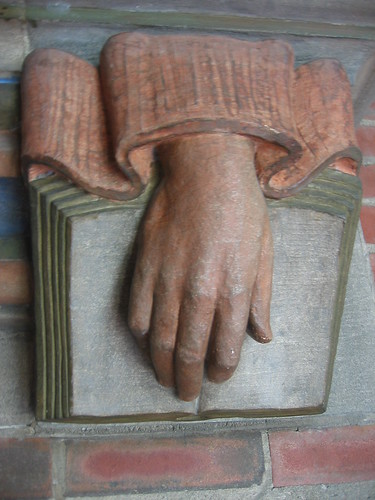
{Photo by Flickr user Libär of the Thomas-Mann-Haus in Lübeck. Used under a Creative Commons license.}
On the heels of a discussion with a friend over the weekend about the fact that, despite my love of Thomas Mann's other novels, I've never been able to scale the heights of The Magic Mountain, Maud Newton wrote about her recent decision to take up the novel again. She--and A. S. Byatt's introduction to the Modern Library edition, from which Maud quotes--just may have convinced me to finally give it another try.
Thinking about Mann sent me back to Elizabeth Hardwick's essay about him at his centenary, collected in Bartleby in Manhattan (1983). It's a perceptive essay, fundamentally admiring but not failing to note Mann's faults. The whole essay is worth seeking out, but its high point is this bit of potent analysis:
Mann has the rare gift of creating characters out of ideas, prejudices and cultural affectations. . . . Mann's artists and thinkers are marked by a sense of separateness, but they are also attacked from time to time by the rash of envy. Their great loneliness is a calling, and in solitude they honor that part of themselves Goethe called his "sacred earnestness." Nevertheless the exalted person will be brought down to envy the easy and unreflecting sexuality of the "normal." Mann's characters are cut off from love by illness, by a chastity that is either circumstantial or temperamental, by an overwhelming sublimation.I also pulled down from my shelf Javier Marias's wonderful little volume of writers' lives, Written Lives, for I remembered that Marias loathed Mann as a person and a writer--and when Marias loathes someone, his vitriol is so pointed and unstinting that it becomes a thing of dark beauty. Take, for example, the opening sentence of his account of Yukio Mishima's life:
The death of Yukio Mishima was so spectacular that it has almost succeeded in obliterating the many other stupid things he did in his life, as if his previous non-stop exhibitionism had been merely a way of getting people's attention of the culminating moment, doubtless the only one that really interested him.Of Mann he writes,
Any writer who leaves behind him sealed envelopes not to be opened until long after his death is clearly convinced of his own immense importance, as tends to be confirmed when, after all that patient waiting, the wretched, disappointing envelopes are finally opened. In the case of Mann and his diaries, what strikes one most is that he obviously felt that absolutely everything that happened to him was worthy of being recorded. . . . They give the impression that Mann was thinking ahead to a studious future which would exclaim after each entry: "Good heavens, so that was the day when the Great Man wrote such and such a page of The Holy Sinner and then, the following night, read some verses by Heine, that is so revealing!" It is perhaps harder to foresee the astonishing, revelatory impact of the prolonged reports on how his stomach is doing.And Marias is just getting warmed up. Later, he writes,
The sad thing about Thomas Mann is that he really believed that he did not take himself seriously, when what leaps out at you, from novels, essays, letters and diaries alike, is his utter belief in his own immortality. One one occasion, in order to play down the merits of his novella Death in Venice, which an American was praising to the skies, all he could think of to bring his admirer down to earth was this: "After all, relatively speaking, I was still a beginner. A beginner of genius but still a beginner." . . . Speaking to an old school friend about death, he commented, "As immortalized by me in The Magic Mountain."Still, much as I love gossipy biography, we read the work and not the man--thank god for Anna Karenina that such is the case!--so I've pulled The Magic Mountain off my shelf, and I'm considering attempting another ascent.
{Though the temptation remains simply to re-read Doctor Faustus instead. Of it, Hardwick writes, aptly:
It is very slow, hard, and yet it has the power to move the feelings in the odd way of something dense, muddy, thick and grandly real. It is very European, one of those moments of the fabulous, written one imagines in a heavy overcoat, amidst the cold stone and marble of the great libraries.When I read it in my early twenties, over the course of mere days while living in a grotty house in London, it gave me chills.}
